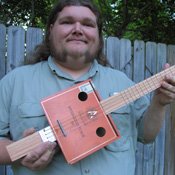Wednesday, June 10, 2009
For three years, Archie Storey had been on a steady diet of Mississippi blues and was looking for a way into the music. The longtime BeBop Records employee listened to the blues constantly and attended festivals around the state, but he wanted to play an active part in the Mississippi blues scene.
"I'm a really hands-on, crafty kind of person and I wanted to get my musical itch out," he says.
His answer came while watching a video of the blues-influenced rock band, North Mississippi All Stars, in late 2007. A segment where All Stars guitarist Luther Dickinson played a guitar made from a cigar box and a broom handle intrigued Storey.
"I said: 'That's a box and a stick. That's all it is,Ҕ he says now.
Following up with a quick Internet search, Storey found out that the instrument was a cigar-box guitar. "This is what I want to do," he realized. After finding a spare cigar-box around the house and making a quick trip to the hardware store, he began putting together his first guitar that night.
Although he wasn't aware of it then, Storey had joined a growing subculture of cigar-box guitar makers.
The tradition of making instruments from cigar boxes can be traced back to the years following the Civil War. Constructed and played by aspiring musicians who didn't have the money to buy an instrument, cigar box guitars were the first instrument for many famous musicians, including blues legend Lightnin' Hopkins, country guitarist Roy Clark and rockabilly star Carl Perkins.
Cigar-box guitars became less common after World War II when mass-produced instruments became less expensive, but they have experienced a revival over the past decade. Amateur craftsmen and do-it-yourself musicians have distributed instructions on how to build cigar-box guitars through the Internet, and the instrument has become popular among many blues-influenced musicians, especially those looking to create a sound that references the blues of the 1920s and '30s.
Storey recalls that his first cigar-box guitar "went together so easy, I couldn't believe it." He was immediately hooked and began building them at a steady pace. Over the past year and a half, Storey has built 18 cigar-box guitars and one cigar-box bass. He dubbed his instrument "the Mississippi Blues Box," referencing the cigar-box guitar's close association with many legendary blues musicians.
The raw materials for Storey's guitars come from a variety of places. He buys the cigar boxes at craft stores (which buy the boxes in bulk from cigar companies), and his wood for the guitar's fretboard come from a local hardware chain. Storey buys tuning pegs, guitar strings and wire for making frets from a music store, but admits that the materials can have more humble origins.
"If you go to a garage sale, you can just about make a guitar out of the stuff you find there," he says.
Storey is selective about the cigar boxes he uses for his guitars. He only uses wooden boxes, but has to be careful when picking one out. "They might look good, but not every box works," he says.
A cheaply made cigar box can come apart during the building process, which Storey knows from bitter experience. "If any part of the guitar breaks while you're putting it together, you just have to scrap the whole thing," he says. "There's no way to go back and salvage it."
While many of his early guitars have gone to friends, Storey has also built them for professional musicians, including guitarist JJ Grey (of JJ Grey and Mofro) and for members of blues harmonica player Jason Ricci's band.
"Shawn Starsky (Ricci's guitarist) said he liked my guitar because he didn't have to stick to 'the books,Ҕ Storey says. "He could play anything he wanted because it wasn't a 'real' guitar."
Storey has begun to build connections with more musicians by displaying his cigar-box guitars at blues festivals around the state. He showed them at this year's Juke Joint and Highway 61 Blues festivals, and he plans to be at the Sunflower River Blues Festival in Clarksdale this August.
Although he wants to further his reputation as an instrument builder, Storey encourages others to try making a cigar-box guitar. "I'd like to sell them, but I think everybody (who is interested) should make one," he says. "If you can string a wire on a stick and get a sound out of it, it's almost endless the way you can make it look."
For more information on Archie Storey's "Mississippi Blues Box" guitars, call 228-229-6159 or visit http://www.myspace.com/mississippibluesbox.

Comments
Use the comment form below to begin a discussion about this content.
Sign in to comment
Or login with:
OpenID